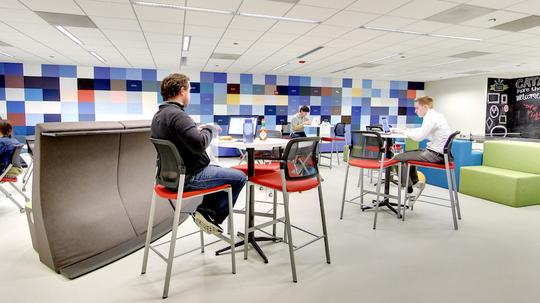
Every entrepreneur knows the statistic. Somewhere around 90% of startups are going to fail, and even the best ideas with the best execution can succumb to the risky nature of starting a new business.
But at Chicago incubator and co-working space Catapult, the numbers look a little different. In fact, since the space launched five years ago, 90% of the startups that’ve come through its doors have been acquired or are still active today.
Catapult isn’t as big and flashy as some of the competing co-working spaces around town—it’s just 10,000 square feet—but it boasts an enviable startup hit rate that you’d be hard pressed to find at any other space in Chicago.
Its member companies have included some of the hottest startups Chicago’s seen in the last half decade, including Shiftgig, Opternative, Bucketfeet, Rippleshot and Jiobit, along with Shark Tank standouts Packback and Rent Like a Champion.
Since it launched in 2012, Catapult members have raised $150 million in venture funding, hosting 43 companies that have employed 800 people. Five of Catapult's members have been acquired, including Plantlink (acquired by Scotts Miracle-Gro), TempoIQ (acquired by Avant) and Tastebud (acquired by Raise). Among the few failures Catapult has seen is wearable tech startup Rithmio, which raised $3.6 million and shut down at the end of 2016.
So, what sets Catapult apart? Not just any startup can come in and rent desk space. Companies interested in joining Catapult must pitch their businesses to Catapult's members, who then decide whether or not to admit the company into the space. Startups have to be beyond the idea stage, have proven business traction, product-market fit, around 10 or less employees, and generate revenue, Catapult General Manager Caitlin McAllister said.
Not every startup gets in (Catapult turned down two companies last month), and it's a model that helps the small co-working space punch above its weight, she said.
"We’re small, but mighty," McAllister said. "We’re looking for the best of the best. That's why we have such a good success rate."
Catapult, which is industry agnostic and doesn't take equity in startups, also fosters a spirit of collaboration between its member companies and the alumni network of startups that have since moved out, McAllister said.
"People come to Catapult because they want to learn from others and receive help from others," she said. "Businesses here are at the same stage and see the same problems that come with scale. It's a help-me-help-you environment."
And Catapult's newest members have the potential to keep the co-working space's batting average high: Fly.io, an Application Delivery Network that makes a company's apps run faster, is co-founded by Kurt Mackey, who previously founded Y Combinator-backed Compose, which sold to IBM in 2015; Rhabit, founded by two former NCAA tennis players, gives aspiring athletes access to top tennis coaches and professionals through instructional videos and online lessons; and Pay Your Selfie lets users get paid for, you guessed it, taking selfies while providing custom data to brands. Its clients include Crest toothpaste and Goose Island beer.
Catapult has also gone through a space renovation and a website overhaul to give its members even more resources to build their businesses, McAllister said.
"Companies that have graduated five years ago are still coming back for founder forums and events," she said. "The model continues to work."








